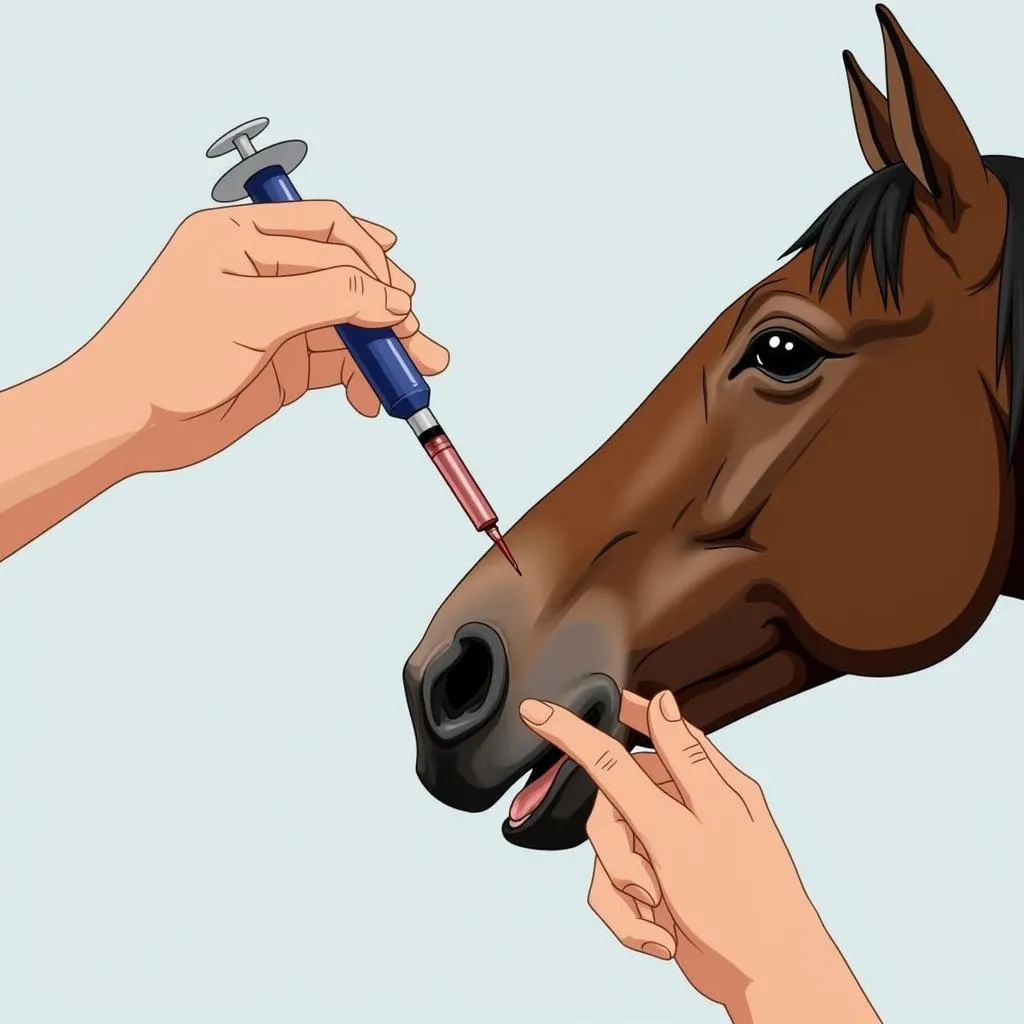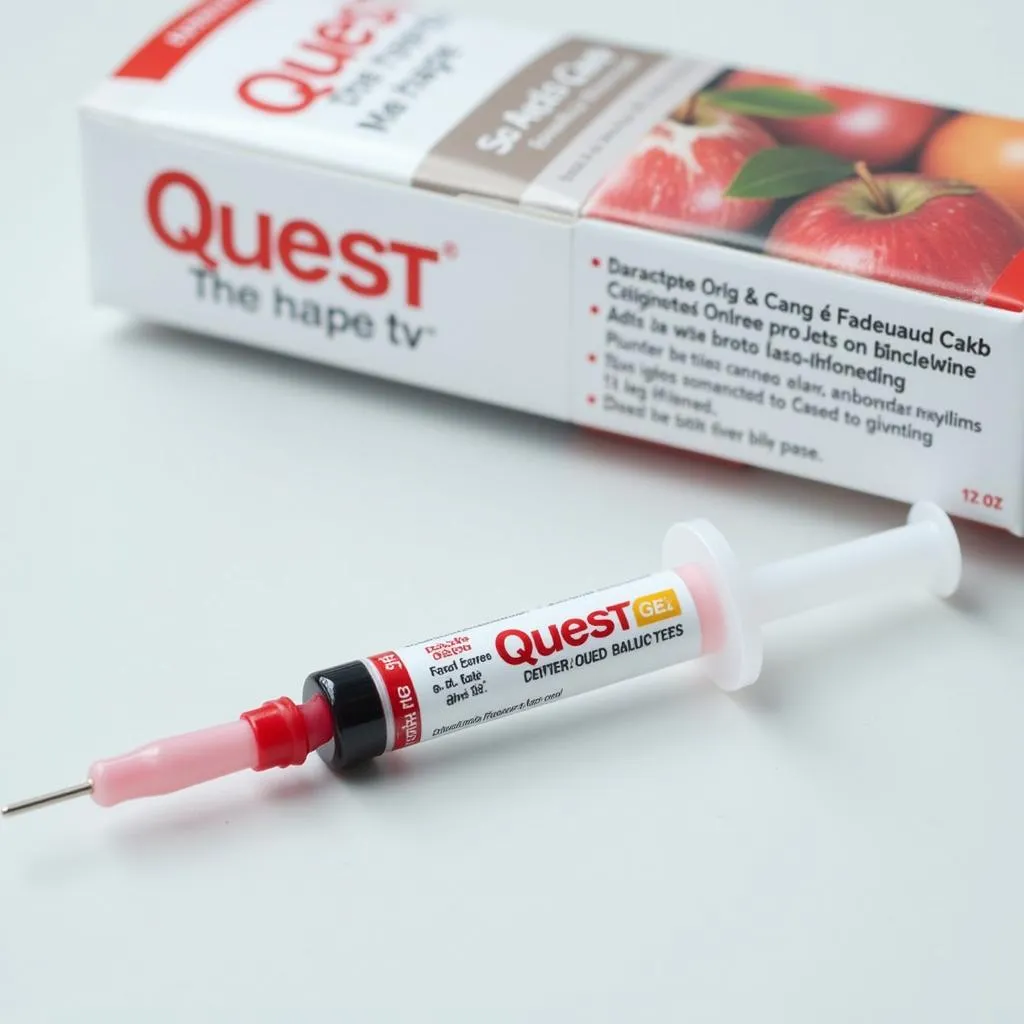Quest Gel is a highly palatable oral wormer for horses of all ages. It is effective against a wide range of internal parasites, including roundworms, tapeworms, bots, and lungworms. Quest Gel is a popular choice for horse owners because it is easy to administer and has a low risk of side effects.
 Horse owner administering Quest Gel
Horse owner administering Quest Gel
Understanding the Importance of Deworming
Just like any other animal, horses are susceptible to internal parasites. These parasites can cause a range of health problems, including weight loss, colic, diarrhea, and even death. Regular deworming is essential for maintaining the health and well-being of your equine companion.
What is Quest Gel?
Quest Gel is a broad-spectrum anthelmintic, meaning it is effective against a wide variety of internal parasites. Its active ingredient, moxidectin, works by disrupting the nervous system of the parasites, leading to paralysis and death. This makes Quest Gel a highly effective wormer, capable of eliminating even the most stubborn infestations.
Why Choose Quest Gel for Horses?
There are many reasons why horse owners and veterinarians trust Quest Gel.
- Broad-spectrum protection: Quest Gel offers comprehensive protection against a wide range of internal parasites, ensuring your horse stays healthy.
- Ease of administration: The gel formulation comes in pre-filled syringes, making it easy to administer, even for those new to horse care.
- High palatability: The apple-flavored gel is readily accepted by most horses, eliminating the struggle of administering unpleasant-tasting medications.
- Safety and efficacy: Quest Gel has been rigorously tested and proven safe for horses of all ages, including breeding stallions and pregnant mares.
- Long-lasting protection: A single dose of Quest Gel can provide up to 12 weeks of protection against various parasites.
 Quest Gel syringe and packaging
Quest Gel syringe and packaging
How to Administer Quest Gel
Administering Quest Gel is a straightforward process. Here’s a step-by-step guide:
- Determine the correct dosage: The dosage of Quest Gel is weight-dependent. Consult your veterinarian to determine the appropriate dosage for your horse.
- Prepare the syringe: Remove the cap from the pre-filled syringe.
- Restrain your horse: Use a halter and lead rope or enlist the help of an experienced handler to restrain your horse safely.
- Administer the gel: Insert the syringe into the space between your horse’s cheek and teeth. Depress the plunger to dispense the gel onto the back of the tongue.
- Ensure the horse swallows: Hold your horse’s head up for a few seconds to encourage swallowing and prevent spitting out the medication.
Potential Side Effects
Quest Gel is generally safe for horses. However, like any medication, some horses may experience mild side effects. These may include:
- Loss of appetite
- Mild colic
- Diarrhea
If you observe any severe or persistent side effects, contact your veterinarian immediately.
Quest Gel for Specific Cases
Pregnant Mares: Quest Gel is safe for use in pregnant mares. However, it is always best to consult with your veterinarian before administering any medication to a pregnant animal.
Foals: Quest Gel can be safely administered to foals as young as 6 weeks of age.
Breeding Stallions: Quest Gel is safe for use in breeding stallions.
 Healthy horse grazing in a pasture
Healthy horse grazing in a pasture
FAQs About Quest Gel for Horses
Q: How often should I deworm my horse with Quest Gel?
A: It’s recommended to deworm your horse every 12 weeks with Quest Gel for optimal parasite control. However, your veterinarian may recommend a different schedule based on your horse’s individual needs and risk factors.
Q: Can I use Quest Gel with other dewormers?
A: It is not recommended to use Quest Gel simultaneously with other dewormers unless advised by your veterinarian.
Q: What should I do if my horse spits out Quest Gel?
A: If your horse spits out some of the gel, do not re-administer the dose. Contact your veterinarian for advice.
Conclusion
Quest Gel For Horses offers a convenient and effective solution for controlling internal parasites. By understanding the importance of deworming and following the recommended administration guidelines, you can contribute to your horse’s overall health and vitality. Remember to consult your veterinarian to determine the best deworming program for your equine companion.
If you have any further questions about Quest Gel or need assistance with your horse’s health, please don’t hesitate to contact us.
Phone: 0772127271
Email: [email protected]
Address: QGM2+WX2, Vị Trung, Vị Thuỷ, Hậu Giang, Việt Nam.
Our dedicated team is available 24/7 to provide expert advice and support.